July 26th, 2010
Mark DiMassimo’s one on one interview with the host of Your World with Neil Cavuto on Fox News Channel.

July 26th, 2010
Mark DiMassimo’s one on one interview with the host of Your World with Neil Cavuto on Fox News Channel.
MISTAKES NOT TO MAKE IN A SOCIAL WORLD.
CNN has fired senior editor of Middle East affairs Octavia Nasr. As Daniel Halper pointed out the other day, Nasr wrote on Twitter on July 4 that she was “sad” to hear of the death of Hezbollah’s Sayyed Mohammad Hussein Fadlallah–a man for whom she has “respect.” Fadlallah had justified suicide bombings, is believed to be responsible for the Marine barracks bombing, and had said that “Zionism has inflated the number of victims in this Holocaust beyond imagination.”
Mark DiMassimo, CEO and Chief Creative Officer of DIGO and Eric Yaverbaum, CEO of Ericho Communications, talk about their new movement, Offlining on ABC TV.
NEW YORK (WABC) — A new campaign to spend more face to face time is called “Offlining”. Eric Yaverbaum is a PR head, and Mark DiMassimo is a marketing executive. They frequently work together, but these days, they are the client. “We got together and said what’s bugging us about the world, and we said the off button. No one is selling the off button,” Yaverbaum said. In other words, everyone is yapping, texting and typing away. So, Eric and Mark are spending their own money to get people to turn off those devices, they call it Offlining. “We would like to accelerate a conversation of building offline time into life, that’s basically it,” said DiMassimo. To read more click here.
We love an articulate and informed fan… check this out from Growing a Green Family.
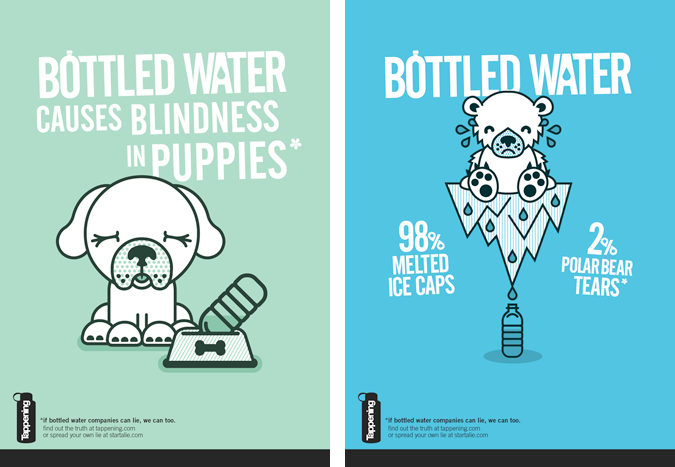
‘Tappening has got to be the best flipping anti-bottled water campaign ever created. Tappening was covered at the New York Times last year but I just learned about them today.’Tappening targets bottled water companies with a simple tactic – they lie about them. One of their posters claims “Bottled Water: 98% Melted Ice Caps. 2% Polar Bear Tears” and another reads, “Bottled Water is the Primary Cause of Restless Leg Syndrome.” My favorite poster is the puppy poster though. I think it should be on an organic shirt that I could wear all the time!”Now, in case your morals are in a bunch over Tappening keep in mind that they based their idea to lie directly on the fact that water bottle companies lie continually.’ To learn more about Tappening click here.

There’s not really much more to say here… the mustaches have an eloquence beyond our poor power to add or detract. But I suppose I will add that it’s not everyday that you can fight prostate cancer with something you grow on your face. So, when the opportunity came along, we put our upper lips, our relationships and our dignity on the line. And, once again, the results are as plain as… well, you get it.
https://www.movember.com/us/donate/your-details/team_id/2718
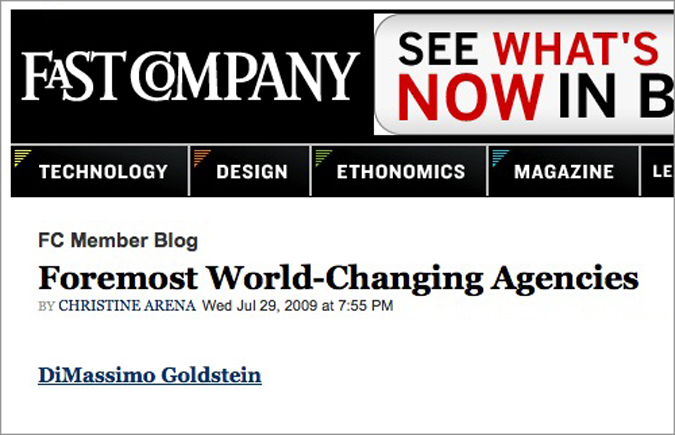
“The reality is that good agencies are a dime a dozen. But great agencies – the kind that transform the way we see, buy and experience things – are few and far between. The World-Changing Agencies described below deserve credit, because what they do each and every day moves the market and improves people’s lives for the better. Their passion and purpose, their goals and strategies, their mediums and messages, encourage each of us to step back and see the bigger picture.
World-Changing Agencies encourage people to think twice before they buy. Through their work, we can redefine ourselves:”
“The advertising world is undergoing a considerable transformation. About five years ago, many large agencies began investing in environmental, social and cause-related practices areas to capture what they perceived as a growing niche market and to complement their existing core services. Today more agencies (albeit just the smarter ones) recognize that such moves are limiting. What’s really needed is a sophisticated new worldview that incorporates essential social, cultural and environmental intelligence into the core organizational capacity. World-Changing Agencies possess this worldview, and it shows up in most everything they do.
World-Changing Agencies exist for a purpose: to assist clients in reaching positive social and environmental outcomes, thereby helping to create a better future for all. Through groundbreaking creative work, such agencies offer people new ways of seeing the world, and new ways of defining themselves within that world. That’s what the term “World-Changing,” originally coined by Alex Steffen on his environmental website WorldChanging.com, essentially means.
The List:
Saatchi Pakistan True Blue
Saatchi S
Cone
Global Change Network
Emotive Brand
Frog Design
Green Order
DiMassimo Goldstein (DIGO)
According to the New York Times, the recent ads spun out of DiMassimo Goldstein (DIGO) might be doing to the bottled water industry what antismoking ads did to the tobacco industry back in the 1990’s – causing major headaches. In case you’ve missed the unfolding “Tappening” campaign, the interactive and print ads are designed to encourage consumers to drink tap water whenever possible. They are deliberately outlandish, poking fun at the bottled water industry’s environmentally wasteful and often misleading nature. One poster claims: “Bottled Water Causes Blindness in Puppies.” Another reads: “Bottled Water: 98% Melted Ice Caps. 2% Polar Bear Tears.” All the ads are supported by an informative website, Tappening.com, where people can learn about the hazards of bottled water and what they can potentially do about them.
“We’ve spent these two years using our marketing and public relations abilities to un-sell bottled-water hype,” agency head Mark DiMassimo recently told Brandweek. “But I still see cascading waterfalls on labels that do not list the source of that water.” The agency is on a mission to help reverse the tides, and is using its arsenal of social media, web and advertising tools to do just that. In addition to promoting unbottled water, DIGO also helps organizations like Memorial-Sloan Kettering and ThinkorSwim to reach people with messages that resonate at the deepest levels.
Traders are an elusive and coveted audience. Yet these epitomes of self-directed consumers have broken many a marketer.
Whether retail or pro, the key to making it with traders is understanding the trader psyche’, tapping into the trader myth, and speaking trader language.
Here are some winning examples from the DIGO archives, including classic campaigns and work as current as today.
ISLAND – THE TRADER’S MARKETPLACE
Trader’s trade. When you get it right, things can happy fast. This campaign helped Island emerge from deep in the pack to overtake Instinet and become the #1 market for professional traders. It took less than one year.



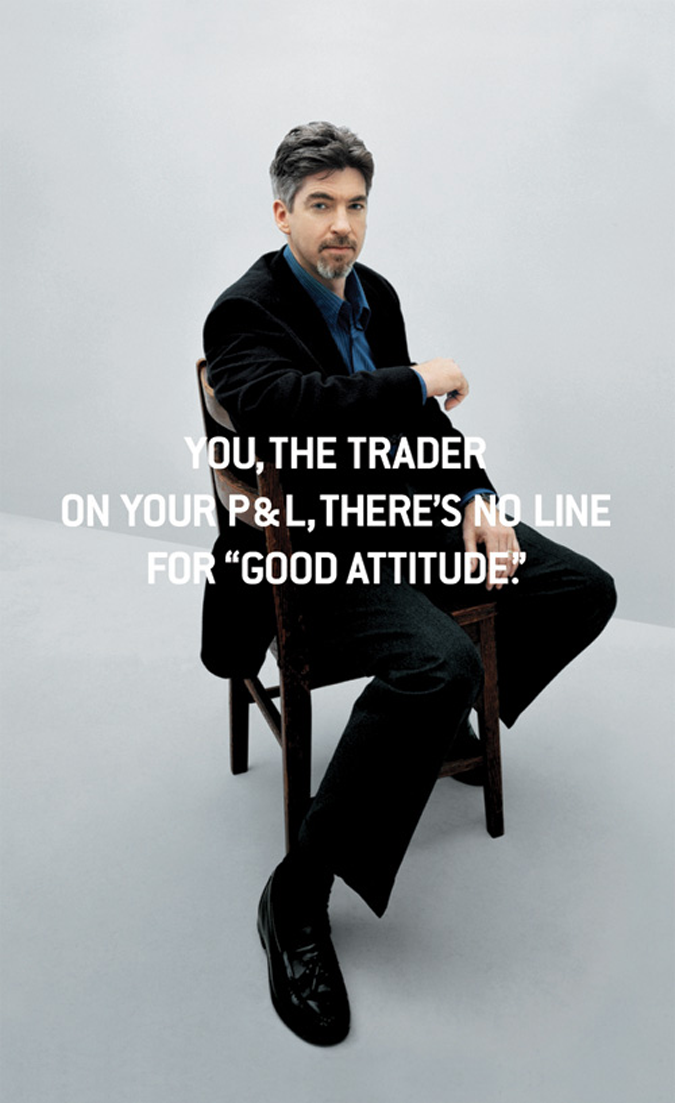
INET – I’d Rather Be Trading.
The essential truth of the trader’s world. Everything else pales in comparison. When a campaign captures a category truth in an entertaining way, it can quickly go social. Trader’s immediately made this campaign their own, sending us their own gorgeous and sometimes unprintable ads. Years later, several classics are still in email circulation. Check out some trader-created INET ads.
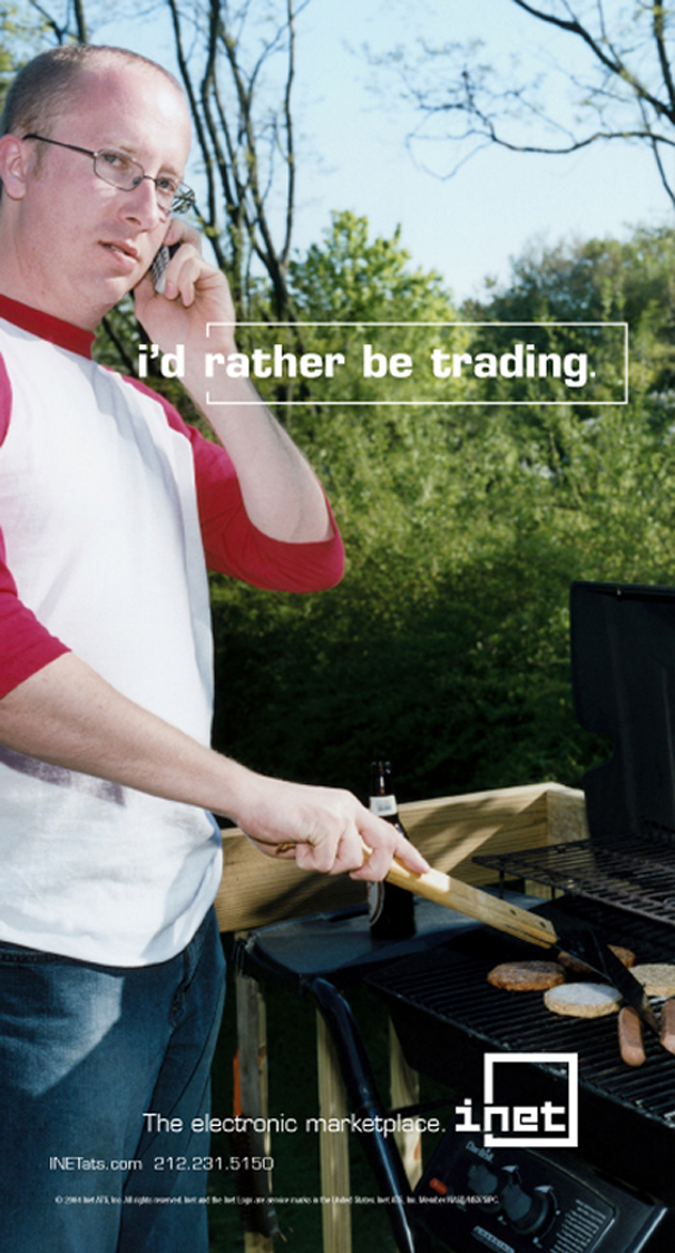
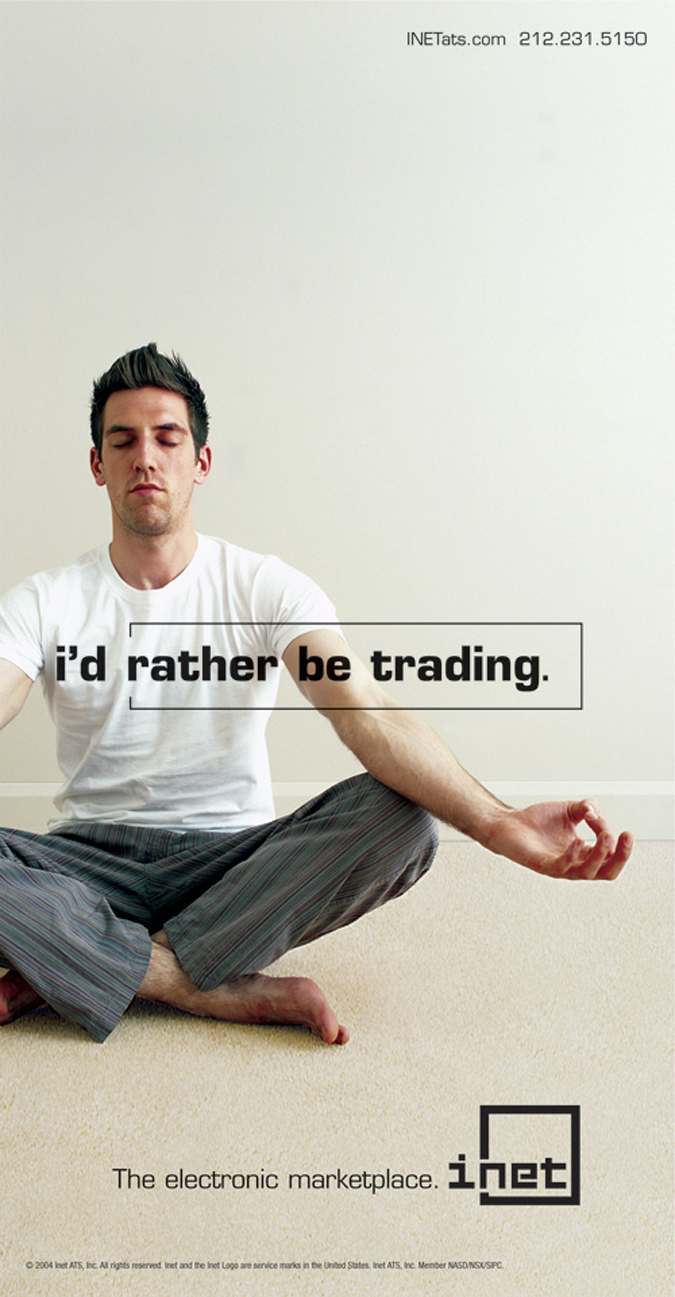
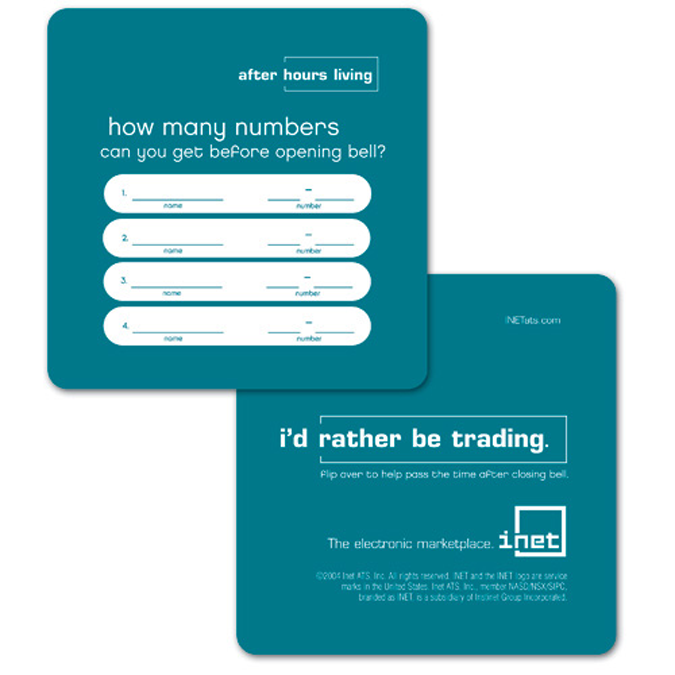
thinkorswim – the counter-phobic impulse.
How are traders like bulls? Wave the red cape of caution in their faces, and they’re ready to charge! These acquisition display ads proved it.
thinkorswim – love at first trade. Traders want the thrill designed into their tools, just as sports car drivers want more than a way to get from a to b. When it feels right, they know it.
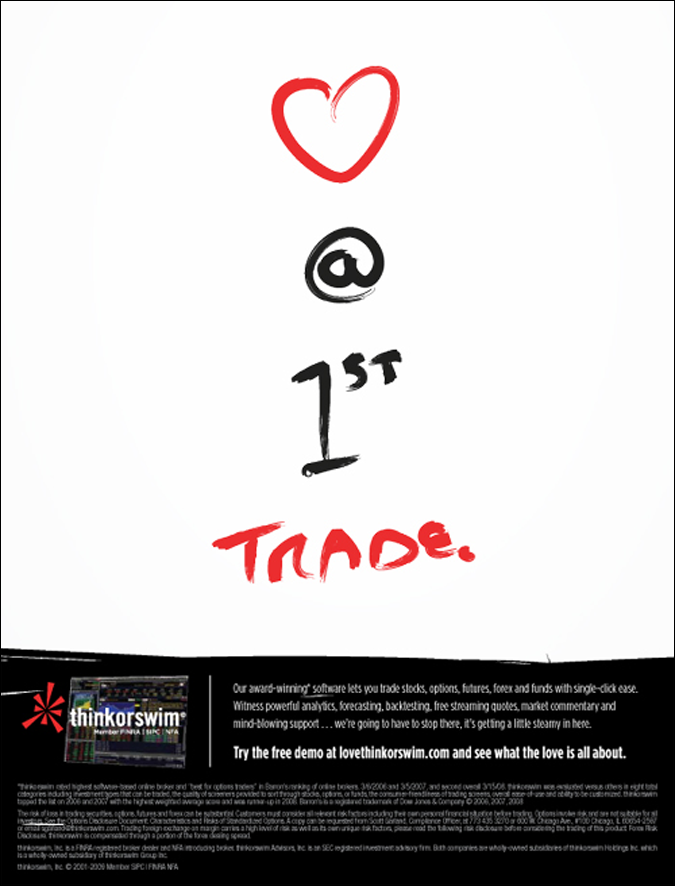
The trader psyche’ extends far beyond stocks, bonds, futures, forex, options and commodities. Airline miles, hotel bookings, borrowing, shopping, saving – just about everything – can be and is played as a trading game.
Today, every marketer must succeed with the self-directed decision-maker. Studying traders – the most avid species of self-directed consumer – is a great place to start.
Smartmoney.com – financial technology so smart it’s kind of scary.
The Wall Street Journal / Blogs
By Kelly Spors
If you launch a public-awareness campaign about an important environmental cause – and then generate $6 million in sales from it — are you a greedy entrepreneur or a selfless environmentalist? Or both of the above?
That’s the question Mark DiMassimo and Eric Yaverbaum are asking.
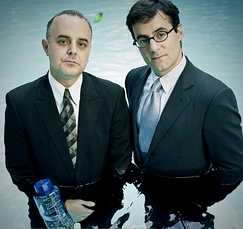
About 17 months ago, the New York entrepreneurs and marketing professionals launched Tappening.com, a Web site that tries to expose the environmental and potential health hazards of drinking from disposable plastic water bottles. The site includes links to news articles, studies, and online videos about how plastic water bottles are harmful to the environment and to consumers’ health. It also includes extra features, such as a database where users can find quality reports on tap water in their state.
Mssrs. DiMassimo and Yaverbaum claim they launched the campaign out of passion for the cause. But to cover the costs of the marketing campaign, they hoped to sell 39,000 reusable water bottles that they had made. They put a lime-green “Buy Now” button on the top of the Web site where site visitors could buy their bottles for $14.95 to $18.95 plus a $3 shipping fee.
But excitement for their viral campaign – and their water bottles – was beyond expectation. They sold 39,000 water bottles within two days and currently have sold more than 400,000 of them, reeling in $6 million in sales thus far. They received tons of media coverage and celebrities including Cameron Diaz were spotted sporting a Tappening bottle. More than 7 million people have visited the site.
In recent months, however, Mr. Yaverbaum says they’ve been criticized increasingly by consumers and media, such as talk radio hosts, for making so much money off what they were positioning as a cause. Mr. Yaverbaum denies they started Tappening to generate revenue, but says, even if they had, there’s nothing wrong with that. “If I was doing it for the money, would that be such a bad thing?” he said in a phone interview. “Wouldn’t that be a really good business model to create shareholder value while also doing good for society?”
He says they plan to continue growing Tappening and have thus far funneled all $6 million back into it, though still adhere to the original public-awareness mission. Tappening currently has about 30 employees.
To play off the criticism – and yes, generate even more publicity for their site — Tappening.com last week posted an online poll where visitors could vote on whether the businessmen are “Greedy Entrepreneurs,” “Selfless Environmentalists” or “Both.” Just under 50,000 people have voted so far. About 12,000 think they’re greedy, 13,000 think they’re selfless and 25,000 think they’re both.
Readers, how about you? Are they greedy, selfless or both? Or have they stumbled on a smart business model that more entrepreneurs could learn from?
Link: Original article…